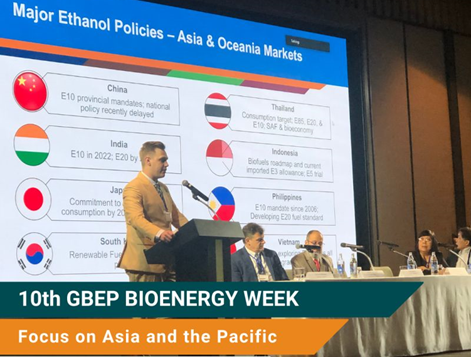The U.S. Grains Council (USGC) recently participated in the 10th Global Bioenergy Partnership (GBEP) Bioenergy Week, sharing with 120 bioenergy stakeholders the growing role of fuel ethanol as a transport decarbonization tool across the Asia-Pacific Region.
The 10th GBEP Bioenergy Week, organized by the Food and Agriculture Organization of the United Nations (FAO), was held in late October in Bangkok, Thailand. While the event highlighted global bioenergy developments and initiatives, this year’s event was especially focused on the Asia-Pacific region, where bioenergy is a key component for meeting rising energy demand while moving toward net-zero targets.
“The GBEP is an essential platform for regional and global bioenergy leaders – from both the public and private sectors – to discuss and exchange knowledge on industry trends, best practices and opportunities and challenges in the bioenergy sector,” said Chris Markey, USGC assistant regional director for Southeast Asia and Oceania.
“The Council continuously supports GBEP members with ethanol knowledge exchange and capacity building programs that augment decarbonization efforts and mutually beneficial economic growth and income generation,” Markey added.
The Council’s presentation analyzed the driving factors for increasing ethanol adoption by regional policymakers and consumers and provided an outlook on production and policy developments through 2030. Ethanol usage across the Asia-Pacific region – which consists of East, North and Southeast Asia and Oceania – continues to expand as policymakers and industry stakeholders look to reduce greenhouse gas (GHG) emissions from the transport sector, bolster fuel security, stimulate new investment and provide consumers relief at the pump.
Exports to the Asia-Pacific region accounted for 12 percent of the United States’ ethanol export volumes for the 2022-2023 marketing year, and more than 25 percent of export volumes when excluding North American destinations. Consumption is expected to increase in the coming years due to planned policy expansions against the backdrop of strong economic growth and rising incomes. The International Monetary Fund forecasts the Asia-Pacific region will contribute nearly 50 percent of global economic growth in 2023.
The Council’s presentation also outlined the potential for ethanol use in new-use areas emerging across the region, including sustainable aviation fuel (SAF) and bioplastics. For instance, Thailand, the host country for GBEP Bioenergy Week, aims to produce one million liters per day (264 thousand gallons) of SAF from ethanol by 2035 and establish a regional “bioplastics production hub” by 2027 to leverage domestic ethanol capabilities in the country.
About The U.S. Grains Council
The U.S. Grains Council develops export markets for U.S. barley, corn, sorghum and related products including distiller’s dried grains with solubles (DDGS) and ethanol. With full-time presence in 28 locations, the Council operates programs in more than 50 countries and the European Union. The Council believes exports are vital to global economic development and to U.S. agriculture’s profitability. Detailed information about the Council and its programs is online at www.grains.org.

